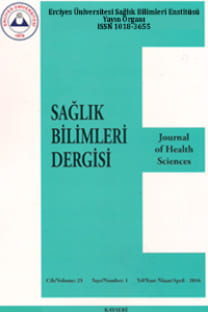ANNE VE BABA ADAYLARININ GEBE OKULUNA KATILMA VE KATILMAMA NEDENLERİNİN BELİRLENMESİ: AYDIN İLİ ÖRNEĞİ
Baba adayı, ebe, gebe, gebe okulu, hemşire
IDENTIFYING THE REASONS OF FUTURE MOTHERS AND FATHERS TO PARTICIPATE AND NOT PARTICIPATE IN PREGNANCY SCHOOL: THE SAMPLE OF AYDIN PROVINCE
Future father, midwife, nurse, pregnant, pregnancy school.,
___
- Referans1. World Health Organization. WHO recommendations: Intrapartum care for a positive childbirth experience. 2018, ISBN: 978-92-4-155021-5.
- Referans2. World Health Organization. WHO İmproving health system performance. WHO recommendation on antenatal care contact schedules. Erişim adresi: extranet.who.int/rhl. 2016; 1-7.
- Referans3. T.C. Sağlık Bakanlığı. Türkiye Halk Sağlığı Kurumu Kadın ve Üreme Sağlığı Daire Başkanlığı. Doğum Öncesi Bakım Yönetim Rehberi. 2018.
- Referans4. Rathfisch G. Doğal doğum felsefesi. İstanbul: Nobel Tıp Kitabevleri; 2012. s. 1-17.
- Referans5. Serçekuş P, Mete S. Effects of antenatal education on maternal prenatal and postpartum adaptation. Journal of Advanced Nursing, 2010; 66(5): 999-1010.
- Referans6. T.C. Sağlık Bakanlığı. Türkiye Halk Sağlığı Kurumu Kadın ve Üreme Sağlığı Daire Başkanlığı. Gebe bilgilendirme sınıfı eğitimci kitabı, Ankara: Türkiye Halk Sağlığı Kurumu Kadın ve Üreme Sağlığı Daire Başkanlığı, 2013. s. 2-17.
- Referans7. Gönenç İM, Çakırer Çalbayram N. Gebelerin, gebe okulu programı hakkındaki görüşleri ve eğitim sonrası deneyimleri. Journal of Human Sciences, 2017; 14(2): 1609-1620. Doi:10.14687/jhs.v14i2.4424.
- Referans8. Kania-Richmond A, Hetherington E, McNeil D, Bayrampour H, Tough S, Metcalfe A. The impact of introduction centering pregnancy in a community health setting: A qualitative study of experiences and perspectives of health center clinical and support staff. Maternal and Child Health Journal, 2017; 21(6): 1327-1335. Doi: 10.1007/s10995-016-2236-1.
- Referans9. Sharma J, O'Connor M, Rima Jolivet R. Group antenatal care models in low and Middle income countries: A systematic evidence synthesis. Reproductive Health, 2018, 5; 15(1): 38. Doi: 10.1186/s12978-018-0476-9.
- Referans10. Dinç H, Yazıcı S, Yılmaz T, Günaydın S. Gebe eğitimi. Sağlık Bilimleri ve Meslekleri Dergisi, 2014;1(1):68-76.
- Referans11. Deibel M, Zielinski RE, Shindler Rising S, Kane-Low L. Where are the dads? A pilot study of a dads-only session in group prenatal care. The Journal of Perinatal ve Neonatal Nursing, 2018; 32(4): 324-332. Doi: 10.1097/JPN.0000000000000368.
- Referans12. Firouzan V, Noroozi M, Farajzadegan Z, Mirghafourvand M. Barriers to men's participation in perinatal care: A qualitative study in Iran. BMC Pregnancy Childbirth, 2019; 19(1): 45. Doi: 10.1186/s12884-019-2201-2.
- Referans13. Yılmaz Esencan T, Karabulut Ö, Demir Yıldırım A, Ertuğrul Abbasoğlu D, Külek H, Şimşek Ç, ve ark. Doğuma hazırlık eğitimi alan gebelerin doğum şekli, ilk emzirme zamanı ve ten tene temas tercihleri. Florence Nightingale Hemşirelik Dergisi, 2018; 26(1): 31-43.
- Referans14. Veringa IK, de Bruin EI, Bardacke N, Duncan LG, van Steensel FJ, Dirksen CD, et al. 'I've changed my mind.', Mindfulness-Based Childbirth and Parenting (MBCP) for pregnant women with a high level of fear of childbirth and their partners: Study protocol of the quasi-experimental controlled trial. BMC Psychiatry, 2016; 16(1): 377.
- Referans15. Polite DF, Beck CT. Nursing research: Methods and principles. 7. Edition, Lippincott Publishers. 2012, 512-515.
- Referans16. Turgut N, Güldür A, Çakmakçı H, Şerbetçi G, Yıldırım F, Ender Yumru A. Bebek A, et al. Gebe okulunda eğitim alan gebelerin bilgi düzeyleri üzerine bir araştırma. Hemşirelik Akademik Araştırma Dergisi, 2017; 3(1): 1-8.
- Referans17. Soriano-Vidal FJ, Vila-Candel R, Soriano-Martín PJ, Castro-Sánchez E. The effect of prenatal education classes on the birth expectations of Spanish women. Midwifery, 2018; 60: 41-47.
- Referans18. Nasiri S, Vaseghi F, Moravvaji SA, Babaei M. Men's educational needs assessment in terms of their participation in prenatal, childbirth and postnatal care. Journal of Education and Health Promotion, 2019; 8: 59. Doi: 10.4103/jehp.jehp_229_18.
- Referans19. Lima-Pereira P, Bermúdez-Tamayo C, Jasienska G. Use of the Internet as a source of health information amongst participants of antenatal classes. Journal of Clinical Nursing, 2012; 21(3-4): 322-30. Doi: 10.1111/j.1365-2702.2011.03910.x.
- Referans20. Eggermont K, Beeckman D, Van Hecke A, Delbaere I, Verhaeghe S. Needs of fathers during labour and childbirth: A cross-sectional study. Women Birth, 2017; 30(4): 188-97. Doi: 10.1016/j.wombi.2016.12.001.
- Referans21. Slomian J, Emonts P, Vigneron L, Acconcia A, Glowacz F, Reginster JY, et al. Identifying maternal needs following childbirth: A qualitative study among mothers, fathers and professionals. BMC Pregnancy Childbirth, 2017; 17(1): 213. Doi: 10.1186/s12884-017-1398-1.
- Referans22. McDonald SD, Sword W, Eryüzlü LN, Neupane B, Beyene J, Biringer AB. Why are half of women interested in participating in group prenatal care? Maternal and Child Health Journal, 2016; 20(1): 97-105. Doi: 10.1007/s10995-015-1807-x.
- Referans23. Nash M. Addressing the needs of first-time fathers in Tasmania: A qualitative study of father-only antenatal groups. Australian Journal of Rural Health, 2018; 26(2): 106-111. Doi: 10.1111/ajr.12371.
- Referans24. Barimani M, Forslund Frykedal K, Rosander M, Berlin A. Childbirth and parenting preparation in antenatal classes. Midwifery, 2018; 57: 1-7. Doi: 10.1016/j.midw.2017.10.021.
- Referans25. Mortazavi F, Keramat A. The study of male involvement in prenatal care in Shahroud and Sabzevar, Iran. Qom University of Medical Sciences Journal, 2012; 6: 66–74.
- ISSN: 1018-3655
- Yayın Aralığı: Yılda 3 Sayı
- Başlangıç: 1993
- Yayıncı: Prof.Dr. Aykut ÖZDARENDELİ
KEMOTERAPİ ALAN MEME KANSERLİ HASTALARA BAKIM VEREN YAKINLARININ YAŞAM KALİTESİ
Zehra ESKİMEZ, İpek KÖSE TOSUNÖZ, Gürsel ÖZTUNÇ, Pınar YEŞİL DEMİRCİ, Semra PAYDAŞ, Gülşah KUMAŞ
GLİSEMİK İNDEKS VE GLİSEMİK YÜK KANSER GELİŞİMİNDE ETKİLİ MİDİR?
Leyla PAŞAYEVA, Hanifa FATULLAYEV, Şehmus KILIÇ, Osman ÜSTÜN, Osman TUGAY
Elife GÖREN, Umut PAYZA, Ahmet KAYALI, Zeynep KARAKAYA, Fatih TOPAL
ÇOCUK KLİNİKLERİNDE ÇALIŞAN HEMŞİRELERDE MERHAMET DÜZEYİ VE MERHAMET YORGUNLUĞU
Gözdenur TANRIKULU, Burcu CEYLAN
Sibel ŞEKER, Funda ÇİTİL CANBAY, Ceylan CESUR, Nasim FİROUZ
Esra ÇETİN, Faik ÖZDENGÜL, Melda Pelin YARGIÇ, Leyla AYDIN
ÖĞRENCİ HEMŞİRELERİN GÖZÜNDEN STOMA DENEYİMİ
Selda KARAVELİ, Esra DEMİRARSLAN
PERİODONTOLOJİNİN TARİHSEL GELİŞİMİ
